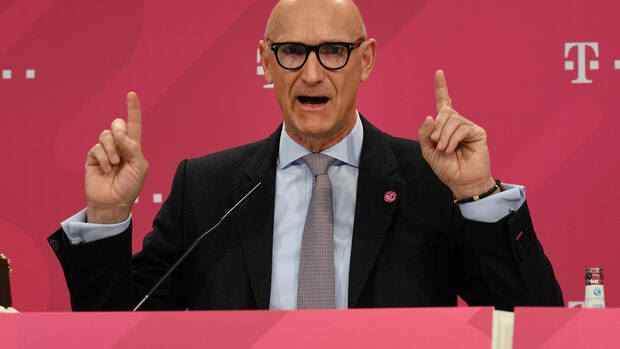The Telekom boss gives the Dax group a new self-image, according to which the operator no longer has to control all networks himself.
(Photo: imago images / sepp spiegl)
Germany wants to be a leading country in digitization. However, the digital infrastructure cannot keep up with this high standard. There are seldom future-proof fiber optic connections.
The most important reason for this is the fact that network operators – above all Deutsche Telekom – have to wait. But now something is changing. CEO Timotheus Höttges is planning fiber optic connections for every household in Germany by 2030. And for this he also wants to collect money from external investors.
This step is a paradigm shift. So far, Telekom wanted to control its networks itself. As a former state-owned company and monopoly, it still controls the German telephone network and offers DSL Internet connections through it. But they are no longer sustainable.
Telekom can hardly afford the billion-dollar expansion itself. Since the merger with rival Sprint in the US last year, Telekom’s mountain of debt has grown to a record € 128 billion at the end of the last quarter. New debts for fiber optic expansion are not included.
Top jobs of the day
Find the best jobs now and
be notified by email.
At the same time, CEO Höttges does not dare to cut the dividend. So he needs an alternative. He found this in external investors. Telekom is currently in final talks with donors to help connect four million households with fiber optics. The investment volume is expected to be around six billion euros.
The partnership with a donor is long overdue. Rival Telefónica is already relying on the insurance group Allianz for fiber optic expansion in Germany. Germany’s digital networks are good business for long-term investors. They promise secure long-term returns. Although Telekom has to share its revenues, it can push ahead with the urgently needed network expansion without having to cover all of the costs itself.
New self-image for Telekom
By opening up to external donors, Telekom is making a big change. It’s about more than just solving an acute financial problem with fiber optic expansion. CEO Höttges is in the process of giving his group with 220,000 employees a new self-image. At the Capital Market Day in May, Höttges already formulated the goal of transforming Telekom into a “Network Orchestrator”.
The CEO uses the cumbersome term to describe the approach of no longer owning all the technologies and networks himself, but of offering different solutions for customers. An example: Höttges does not want to see Elon Musk’s satellite Internet as a product that competes with Telekom’s broadband offerings. The DAX group, on the other hand, could recommend Starlink solutions itself to customers if they best fit their needs, for example in rural areas without satisfactory broadband coverage.
This new self-image is initially an idea. Telekom is still a long way from achieving this goal. For years the group has tried to use the networks of competitors through partnerships. City network operators in many large cities have already established good fiber optic infrastructures. So it makes sense that Telekom does not set up parallel networks, but simply uses the connections in return for rent payments. In practice, however, it runs slowly.
But the direction is correct. External donors and partnerships will help the fiber optic expansion in Germany. Telekom and the other network operators should enter into significantly more of these deals.
More: Telekom is about to make a billion-dollar deal with an investor for fiber-optic expansion
